Законодательная власть и правоохранительная деятельность в Великобритании и США учебное пособие Уровень В1 Составитель
 Скачать 3.57 Mb. Скачать 3.57 Mb.
|
|
| Trying to predict what information will be in a text before you read it is a good habit. It motivates you to read the text, and encourages you to pay attention to what you read to find out if your predictions were correct. |
In this text you will read about the debate on whether or not to make some drugs legal. Work in a group. Use your own knowledge of the topic to predict what will be said in the text. Use the following questions as a guide.
What drugs do you think will be discussed?
What arguments for legalizing drugs do you think will be presented?
What arguments against legalization do you think will be presented?
2. Reading The War on Drugs
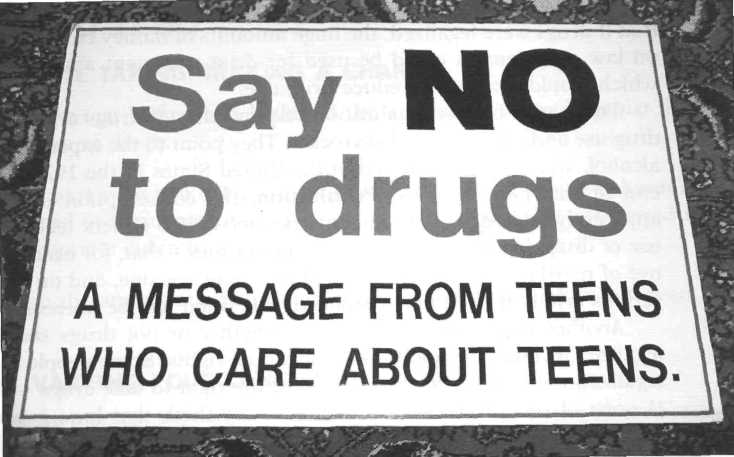
(1) Over the last few decades, the drug problem in the United States (and in many other industrialized countries) has become considerably worse. In 1981, there were about 3 million drug addicts in the United States; today there are around 6 million. The number of drug overdose deaths and drug-related homicides has also increased. This is in spite of the fact that the government has spent more and more money in trying to solve the drug problem. The fight against drugs is often referred to as a "war" or "battle," and most experts now believe the battle against drugs has been a failure. They say it has failed because the government has focused on controlling the problem through laws and punishments, rather than through drug education and treatment.
(2) The failure of the law-enforcement approach has led to calls for other approaches to solving the problem, including the decriminalization and the legalization of drugs. Advocates of decriminalization think that drug users should no longer be labelled as serious criminals and that the punishments for drug use should be significantly reduced. Advocates of legalization believe there should be no restriction on drug use at all, and that individuals should be able to buy drugs the same way they buy cigarettes and alcohol today.
(3) Those who are in favour of legalization argue that the current drug laws do more harm than good. They argue that the current laws waste police time because while police officers are busy arresting people for smoking marijuana, they are not doing the work of arresting robbers and murderers. Further, they argue that the high cost of illegal drugs and the enormous amounts of money to be made from drug dealing encourage more serious crimes. For example, many drug users turn to stealing to support their habit and police can sometimes be bribed to "look the other way." Finally, those who support legalization believe that if drugs were legalized, the huge amounts of money currently spent on law enforcement could be used for drug treatment and education, which would drastically reduce drug use.
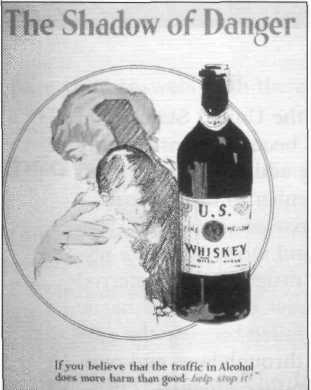 (4) Those who oppose legalization respond that, if drugs are legalized, drug use and addiction will skyrocket. They point to the experience with alcohol, which was prohibited in the United States in the 1920s. At the end of this period, called P
(4) Those who oppose legalization respond that, if drugs are legalized, drug use and addiction will skyrocket. They point to the experience with alcohol, which was prohibited in the United States in the 1920s. At the end of this period, called P Prohibition
the period (1920-1933) when the sale and consumption of alcohol was illegal in the United States.
rohibition, the consumption of alcohol apparently soared by 350 percent (Bennet 1989). Others feel that the use of drugs is a stepping stone to other crimes - that, for example, the use of marijuana leads to the use of heroin or cocaine, and on to more serious crime. If drug use is stopped, this trend will be prevented.
(
After alcohol was decriminalized in the U.S., its consumption increased. Would decriminalizing drugs lead to an increase in drug use?
5) Another aspect of the debate on whether or not drugs should be legalized involves the question of individual rights. Some people call for legalization because they feel they have the right to take drugs - that it is none of the governments business. They think that laws governing this behavior are an invasion of individual rights. On the other hand, others argue that the government should try to protect us from harming ourselves.
(6) Finally, there are those who believe that the problem of widespread drug abuse and crime can only be solved when the government attacks the root causes of the problem: poverty, racism and inequality (Currie 1993). They propose that the government should deal with the factors that cause the problem by providing employment for all, increasing the minimum wage, improving health care for the poor, offering paid family leave, and providing affordable housing.
3. After you read
1. Re-read the text to find and highlight the arguments for and against the legalization of drugs.
2. Make a chart with two columns. Write For at the head of one column and Against at the head of the other. In note format, put the arguments you found in step 1 in the appropriate column.
3. Work with your partner and compare the arguments with the predictions you made before you read.
4. Focus on the Language
1. Look back at the text and find the verbs listed below. Notice how the writer has used different words to provide variety.
• Verbs used to express an opinion
think believe say feel argue
• Verbs used to take a position on an issue
be in favor of call for propose oppose
• Verbs used to discuss causes and consequences
cause encourage lead to
2. Fill in the blanks in the text below with one of the verbs given above, in the appropriate form. Vary the verbs you use. Then compare your answers with a partner.
Many drug experts now (1) __________________ the legalization of drugs. They (2) __________________ that making drug use illegal only (3) __________________ other social problems. They (4) __________________ that it can, for example, (5) __________________ police corruption, and (6) __________________ more crime. Some people also (7) __________________ that the money spent on fighting drug use would be better spent on fighting other crimes. Others (8) __________________ that drug use is a question of individual rights. However, some people (9) __________________ tough drug laws because they (10) __________________ that drug use is morally wrong or because they (11) __________________ drug use will (12) __________________ people to commit other crimes. Others (13) __________________ fighting the underlying factors of poverty and unemployment, which (14) __________________ the problem of drug use.
3. BUILDING VOCABULARY: FIGURATIVE LANGUAGE
| Sometimes a writer uses figurative language - language that causes a picture to come to your mind. If you imagine this picture, it will help you understand the meaning of the expression that the writer is using. |
Find a figurative expression in the text (paragraph indicated) to match the illustrations below. Write the expression next to the illustration.
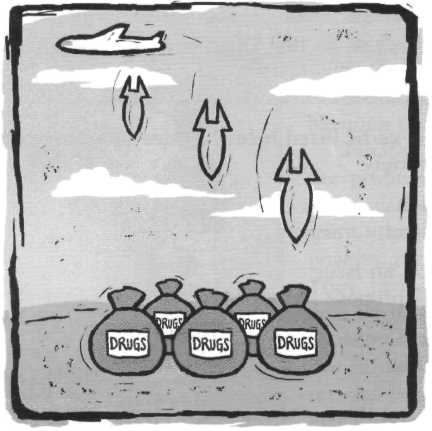 1 (par. 1)
1 (par. 1) the battle against drugs
___________________
___________________
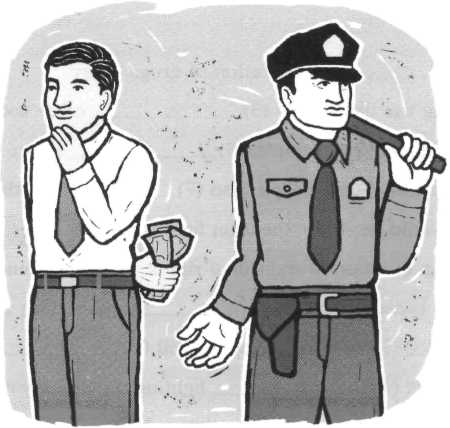
2
(par.3)
___________________
___________________
___________________
3
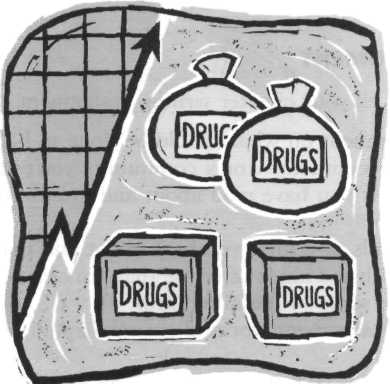 (par.4)
(par.4) ___________________
___________________
___________________
4
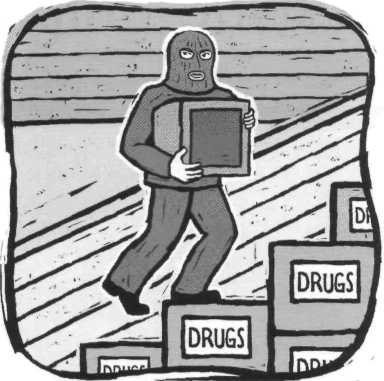
(par.4)
___________________
___________________
___________________
5
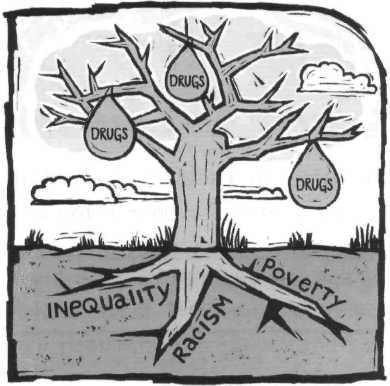 (par.6)
(par.6)___________________
___________________
___________________
Work with a partner. Explain what each expression means.
/From Academic encounters: reading, study skills, and writing. Kristine Brown, Susan Hood/
5. Work in small groups and discuss these questions:
1. Do you favour or oppose the legalization of drugs?
2. Do you think people arrested for possession of small amounts of marijuana should be put in jail, or just have to pay a fine but without serving any time in jail?
3. Which factors determine whether a teenager tries illegal drugs or not?
4. How would you describe the problem of drug abuse across Russia? Would you say it is a crisis, a serious problem, a minor problem, or not a problem at all?
5. What actions could the government take to control the use of drugs?
Writing
Write an essay discussing the arguments for and against legalizing drugs.
Unit 1
Grammar Spot Verb patterns
1. Basic verb patterns
Match a line in A with a line in B.
| A | B |
| a I enjoy b I look forward c You need d I finished e My dad promised f I hope g Anna chose h What do you feel like i I can't afford j I can't stand k Beth helped me l What would you like | waiting in queues. It really annoys me. to buy anything. I'm broke. to do tonight? doing tonight? to see you again soon. to seeing you again soon. do the washing-up. to wear her black suede skirt for the party. cooking. I find it very creative. painting the bathroom last night. to buy me a stereo if I passed my exams. to book if you want to eat at Guido's. |
2. Using a dictionary
1) Look at the dictionary extract. It shows which verb patterns are possible. Some of the verb patterns in the sentences are right, and some are wrong. Tick () those that are right, and correct those that are wrong.
a
stop /stop/ v (-pp-) 1 to put an end to the movement, progress, operation, etc of a person or thing: stop a taxi ◦ Can you stop the machine? ◦ I had to stop somebody in the street to ask the way. 2 to end or finish an activity: stop work ◦ He never stops talking. ◦ She’s stopped smoking. ◦ Has it stopped raining yet? 3 sb/sth (from) doing sth to prevent sb from doing sth or sth from happening: I’m sure he’ll go, there’s nothing to stop him. ◦ You can’t stop our going / us (from) going if we want to. ◦ We bandaged his wound but couldn’t stop it bleeding. 4 (a) to finish moving, happening or operating: Does this train stop at Oxford? (b) to end an activity temporarily; to pause: We stopped for a while to admire the scenery. She never stopped to consider that others might object.
They were completely lost so they stopped asking for directions.
b I stopped working when I had a baby.
c I stopped play tennis when I twisted my ankle.
d The rain was so heavy that there was nothing we could do to stop the kitchen against flooding.
e The policeman stopped me from asking why I was driving at over 100 miles an hour.
f We went home when the sun stopped to shine.
g You can't stop me telling everyone what I know about you.
h He couldn't stop his son from go to the all-night party.
2) Use your dictionary to decide if the -ing form or infinitive is used correctly in these sentences. If there is a mistake, correct it.
Example
stealing
[
 X] They denied to steal the money.
X] They denied to steal the money. a □ I avoid to travel in the rush-hour if I can.
b □ Have you considered to work abroad?
c □ We expected him arriving yesterday.
d □ We agreed to meet outside the cinema.
e □ I've arranged collecting Kate from school at four o’clock.
f □ Karen decided not to go to the party. She was too tired.
g □ I can't help to love him, even though he is selfish and inconsiderate.
h □ I offered give David a lift but he said he'd rather walk.
i □ I can't get used to seeing my daughter driving a car.
j □ He admitted attempting to smuggle diamonds into the country.
k □ I suggest to go to a restaurant tonight.
l □ I want that you come home early.
3. More complex verb patterns
1) Make sentences from the words in the columns. The sentences must make sense!
| My brother wants Our hosts would hate My aunt would love The doctor warned My parents expect The guide advised The policeman told We invited all The teacher made My grandparents let I'd like | me you us my son our friends the tourists the driver her class his patient | to be late. to do well in my exams. do the exercise again. do what we wanted. to fix his bike. to take over my business. to stay close. to come to a party. to slow down. not to work so hard. to visit her more often. |
2) Rewrite the sentences so that they have a similar meaning. Use the prompts, include an infinitive or an -ing form.
Example
I couldn't go to the party last night. (allowed)
I wasn't allowed to go to the party last night.
a I was surprised to see Ben at the party. (expect) …………………………………
b We're having dinner at the Greens' on Saturday. (invited) ………………………..
c I should have a hair-cut. (need) …………………………………………………..
d I can’t wait to see you in June. (looking forward) ………………………………..
e What shall I have for dessert? (can’t decide) ……………………………………..
f The teacher said we could go home early. (let) …………………………………..
g But she said we had to do extra homework. (made) ……………………………...
h Can you wait for a minute? (mind) ……………………………………………….
i I'd prefer to have tea. (rather) …………………………………………………….
j Let's wait before we make a decision. (suggest) …………………………………
k 'I'll lend you some money,' she said to me. (offered) …………………………….
l Please don't make a noise,' he said to me. (asked) ……………………………….
m ‘I’m sorry I woke you up,’ I said to my neighbours. (apologized) ……………...
4. -ing or infinitive?
